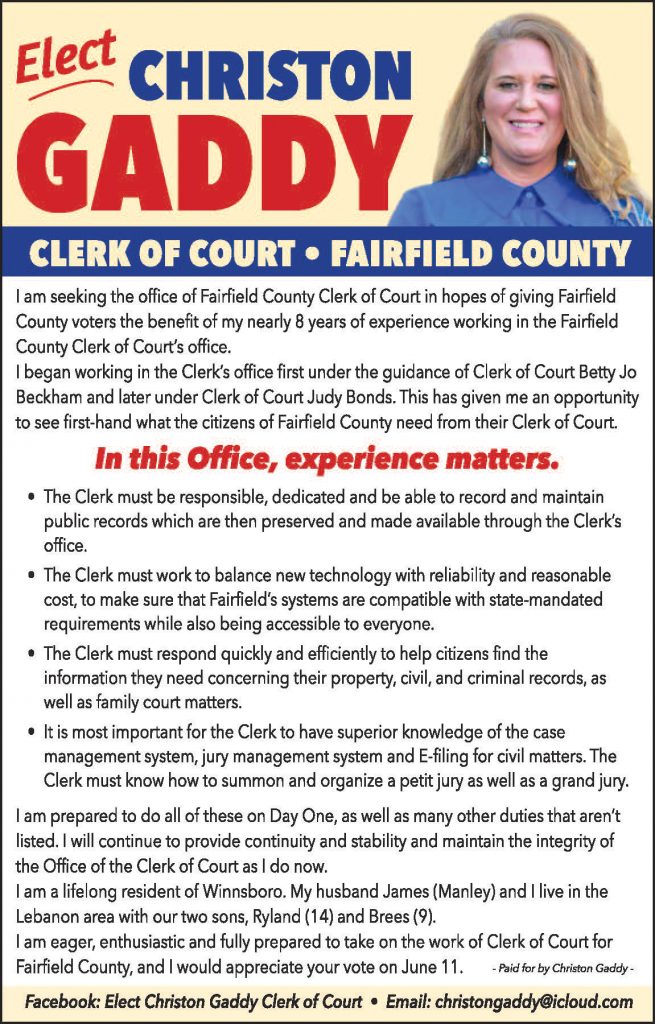JENKINSVILLE – Fairfield County election officials upheld the result of the Jenkinsville annexation vote by a more decisive margin than the original referendum itself.
In a unanimous vote Monday, the Fairfield County Election Commission voted to uphold the results of the June 5 special election that saw the annexation measure fail 19-15.
Commissioners agreed one vote shouldn’t have been counted, but it wasn’t enough to sway the final result.
Their decision to uphold the election was largely influenced by a miscommunication regarding a property owner who opted out, according to testimony. His property bordered other contiguous properties, which could have swayed the vote, town attorneys argued.
Commissioners disagreed.
One official noted a letter from the property owner was sent to the town’s lawyer, and not the Jenkinsville town clerk.
“The letter should’ve been sent to the town clerk, and it was not sent to the town clerk,” election commissioner Alice Rice said. “It was sent to the lawyer instead.”
Betty Trapp, chairwoman of the election commission, said a written order of the board’s findings would be issued as soon as possible.
Trapp said the town could file an appeal in accordance with state law.
Section 7-17-60 says appeals must be filed no later than noon Monday following the date of the county board’s decision, pegging the deadline as June 25.
Had the annexation vote passed and been subsequently adopted by Jenkinsville Town Council, the town would have added 143 properties to its tax rolls, quadrupling the town’s geographical boundaries, according to Fairfield County property records.
Two witnesses were called during Monday’s protest hearing: Jenkinsville Mayor Gregrey Ginyard and Debby Stidham, director of voter registration and election for Fairfield County.
Jenkinsville’s protest cited three main arguments:
The list of eligible voters provided to the polling location included voters outside of the proposed annexation area.
A blind woman’s vote was incorrectly counted.
One property owner exercised his right to opt out, which broke continuity with several other properties.
“At minimum, the above irregularities make the actual outcome of the election uncertain and require a new election,” the protest states.
Jeff Goodwyn, a Columbia attorney representing Jenkinsville, focused primarily on the contiguity issue in his opening statement.
Goodwyn said if the property owner who opted out was excluded, it would’ve dramatically impacted the outcome because other properties would have been excluded as well.
“Without this property, the part of the annexation, it breaks the contiguous nature in the city,” he said. “Their votes were meaningless because they couldn’t possibly be in the town.”
Ginyard affirmed that position during testimony at Monday’s hearing.
“There were quite a few votes that shouldn’t have been counted,” he said. “With the vote count being 19-15, with there being eight to 10 votes in that area, that could’ve swung the election either way.”
Ginyard also testified that a blind woman who voted on a paper ballot intended to vote “Yes.” Her vote was excluded because the “X” didn’t appear in either the “Yes” or “No” boxes, Ginyard said.
Election officials, however, said there’s evidence countering that statement.
Commissioners noted the woman cast her ballot at the county election office using an electronic machine, meaning she couldn’t possibly have voted on a paper ballot.
Stidham did confirm that another voter living outside the annexation area cast a ballot, but noted that wasn’t enough to order a new election.
Stidham added that before the election, she sent a list of eligible voters to Ginyard for verification, but never received a response.
“Going by the map I received with tax map numbers, I never got any feedback,” she said. “I assumed we had those registered voters correct.”
Stidham also said the town never mentioned the voter who opted out.
“The ‘opt out’ you keep mentioning, we had no knowledge of an ‘opt out,’” she testified. “We received nothing in my office to know there was an ‘opt out’ to even remove those voters.”
Not mentioned during the hearing were reports that Ginyard was observed inside the polling location, beckoning voters to speak to him before they could register with poll workers and cast ballots.
Stidham and Fairfield County Councilwoman Bertha Goins told The Voice they witnessed Ginyard calling out to voters. Stidham said she eventually asked Ginyard to allow voters to register.
A state election commission spokesman previously said when public officials speak to voters before they register, it could be viewed as campaigning inside a polling location, a violation of state law.
“That certainly would not look good and could be construed as campaigning, interfering, or intimidating voters,” said Chris Whitmire, spokesman with the S.C. Election Commission.












